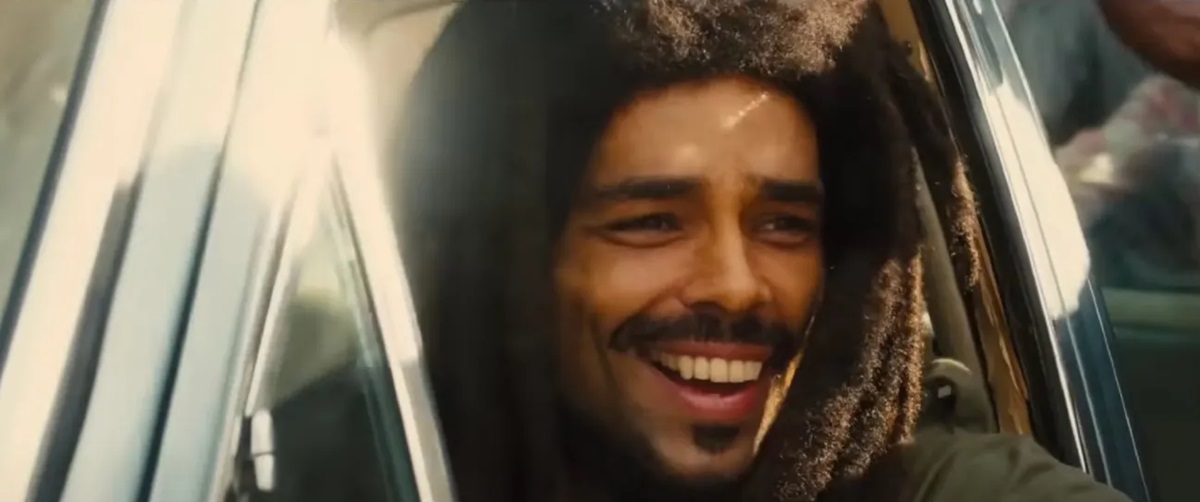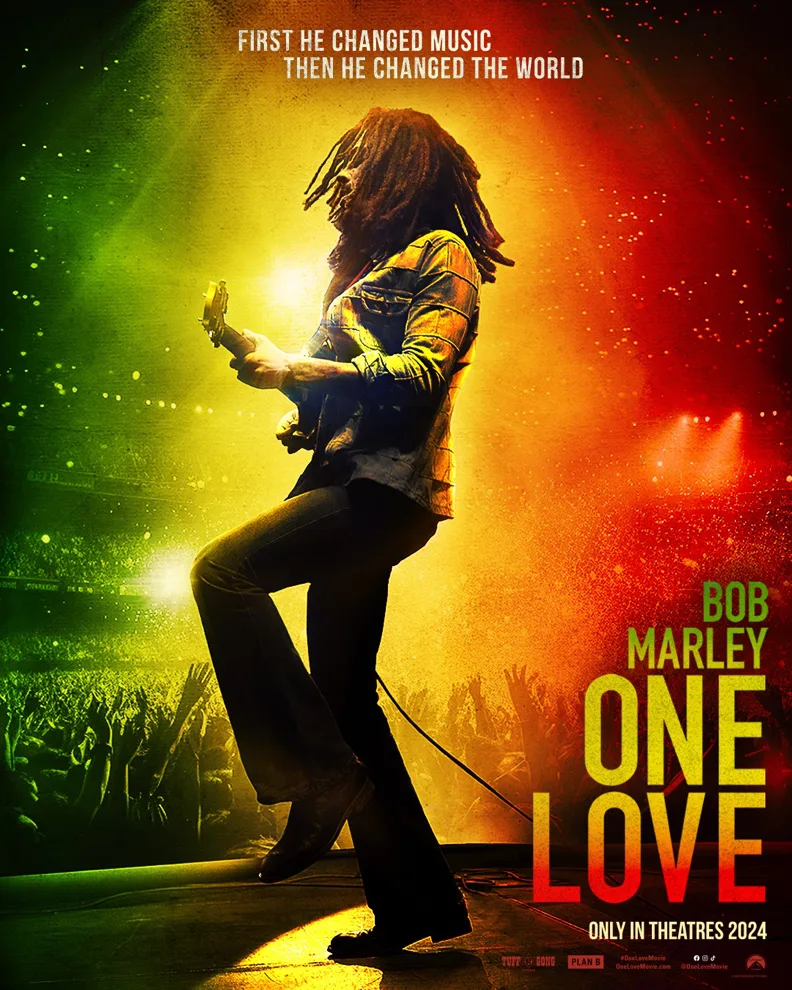“What’s the point?” It’s a question I asked myself over and over again throughout the interminable slog that is “Bob Marley: One Love,” a flattened biopic devoid of a perspective or originality. It follows a long list of musical origin stories that feel designed to sell new pressings of former hits more than tell an engaging story. For all the faults of glib films like “Bohemian Rhapsody” or “Whitney Houston: I Wanna Dance with Somebody,” they at least feigned some interest in their chart-topping subject. But between uneven plotting and unconscionably vapid dialogue, “One Love” acts as though Marley the person is a record skip spoiling its jukebox spin.
Reinaldo Marcus Green, the film’s director, stands as the easy culprit. While his debut “Monsters and Men” signaled some promise, he followed that intriguing work with the saccharine true story of “Joe Bell.” You could give him a pass on that miss; after all, he came to the project late. But then he helmed “King Richard,” a sports family drama that netted Will Smith a Best Actor win even while it traded in caricatures. “One Love” sees Green once again relying on broad themes—struggling and trauma—and the same cardboard concepts of real people that doomed his previous efforts.
And yet, despite earning the lion share of the blame, Green isn’t alone in this misstep. The script, co-written by Green, along with Terence Winter, Frank E Flowers, and Zach Baylin, is a horrendous, unshaped stream of events rendered with the subtlety of bullet points.
The story directly spans 1976 through 1978: Marley, already a formidable political voice in Jamaica, is planning a unity concert to stop the violence inflicted by two warring political leaders. We’re quickly introduced to Marley’s big family—the singer had many kids through his wife and affairs, a fact the film does note—his supportive wife Rita (Lashana Lynch), his nefarious manager Don Taylor, and a few of members of his backing band, the Wailers. With his home being located in a compound, surrounded by high walls and men with machine guns, we already get the sense that Marley’s life is persistently in danger. We also learn that he loves jogging and soccer. And that’s about it.
For a time, the film tricks you into thinking it’s about the Smile Jamaica concert. Unfortunately, we zoom through the gig, as though the creatives are scared to go longer than the first ten minutes without music happening. There is no sense of Marley’s artistry, the political forces happening on the ground, or the imperative people in his life before Donald, Rita, and Marley are shot by assassins (one of them being an underused Michael Ward), causing the ailing trio to leave the country. Marley and his Wailers opt for London, where they begin recording a new record. Rita and the family go to Delaware to live with Marley’s mother. Why she lives in the United States is never really explained, and she’s barely seen on screen.
In “One Love” the writing has a way of sanding what should be delicate narrative curves into harsh inelegant edges. Trite flashbacks hurriedly recall Marley’s difficult childhood–shaped by his white father’s abandonment, giving us a speedy backstory for Marley and Rita’s courtship and the Wailers getting their record deal. It’s all as sappy as the gooey, honeyed lighting employed by DP Robert Elswit. Banal scenes in the recording studio lead you to believe the film will be about the recording of Exodus, Marley’s legendary album: Rapid renditions of the album’s title track along with super hits like “Jammin” deal in the usual cinematic songwriting cliches whereby a tune is composed in a matter of seconds. When Marley catches the Wailers listening to the soundtrack to “Exodus,” Marley declares it the album title. Before you know it, they’re suddenly on a European tour.
Throughout the music biopic, you’re persistently left wondering when “One Love” will be about something or at least have a point of view on Marley’s politics, Rastafarian religion, or even reggae. Instead, Green saddles everyone with bad wigs and hackneyed dialogue in front of ugly compositions while uplifting anthems are minimized by banal set pieces. Toward the end, for instance, Marley sings “Redemption Songs” by campfire as his children slowly gather round him, their faces gleaming with giddy excitement by the crackle of the flames.
No actor is spared from the film’s milquetoast ethos: Though Ben-Adir is committed to imitating Marley’s every gesture, his physicality during the concert sequences is like watching someone engaged in mechanical memorization rather than organic musicality. The staid framing of the shows, a mix of distant mediums does him no favors either. It’s all pretty flat. Overwrought monologues zap the normally bewitching Lynch of her magnetism. “Sometimes the messenger becomes the message,” she tells Marley with a commitment to the character undeserving of the ungraceful words she’s asked to utter. In Marley’s story Rita is often left adrift, only appearing to either offer dense exposition or sage advice to contextualize a marriage whose filmic rendering doesn’t match the picture’s title. We have no sense of what drew Marley and Rita together or how they remained such a strong force in spite of Marley’s philandering.
Before the film began, a video message from Ziggy Marley, Bob Marley’s son, played: He promised this would be an “authentic depiction” of his father. When it comes to art I despise “authenticity,” which by the very nature of the word immediately presumes the existence of a definitive truth. I would rather have a sincere picture, a film interested in the knottiness of a person and the complexity of the life they lived. “One Love” lacks that kind of rhythm, spark, and vitality–the kind that gave Marley’s soulful music its bounce.




















